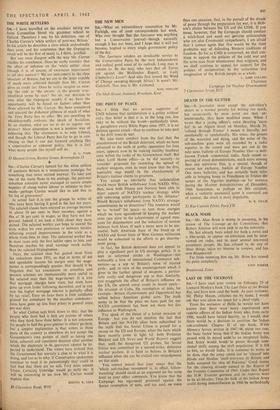THE PRICE OF PEACE SIR,-1 think that no serious supporter
of CND believes that unilateralism is a policy without risks. Our belief is that it is, in the long run, less risky to be without the bomb—particularly since, tt paraphrase every White Paper since 1957, it is no defence against attack—than to continue to take part in the drift towards war.
We take some comfort from the fact that the abandonment of the British deterrent, which we have advanced in the teeth of public opposition for four years, appears now to be making stealthy headway even within the ranks of the Government itself. But when Lord Home offers—as he did recently—to 'consider' proposals for restricting the spread of nuclear weapons, even he must know that the first, inevitable step would be the abandonment of Britain's nuclear claims to greatness.
You accept as inevitable that unilateralism would mean British withdrawal from NATO. Why, then, have both France and Norway been able to reject aspects of NATO's nuclear strategy while still remaining active participants in the Alliance? Would Britain's withdrawal from NATO's strategic commitments be so disastrous? The intention would be to 're-tool' for peace—to turn those energies which we have squandered in keeping the nuclear arms race alive to the achievement of agreed mea- sures for disarmament and the reduction of tension between both blocs. If such a move were to be suc- cessful, both American fears of the break-up of NATO and Soviet fears of West German militarism would be subsumed in the efforts to get disarma- ment going.
In fact, the British deterrent does not appear to play a significant part in US strategic policy. It is seen in informed circles in Washington—not noticeably a hive of international Communist sub- version--as a sop to Britain's sense of injured pride: and, in view of the encouragement which it gives to the further spread of weapons, a particu- larly costly and dangerous sop at that. Similarly, you exaggerate the effect of Britain's influence on the US. On almost every count in recent years— the invasion of Cuba, the resumption of tests, for example—Britain (Government and Opposition) has wilted before American global aims. The truth seems to be that the price we have paid for our NATO commitment has been not more but less influence in Washington.
You speak of the threat of a Soviet invasion of Europe: but you do not mention the fact that Britain and her NATO allies have subscribed to the myth that the Soviet Union is poised for a swoop on the US and Europe, when the facts which have recently come to light (cf. both Professor Blackett and US News and World Report) suggest that, until the dangerous U2 probes, the Soviet Union was committed to a second-strike, defensive nuclear posture. It is hard to believe in Britain's influence when she can be tricked into misjudgments on this scale.
You cannot intend that your smear that the 'whole anti-nuclear movement is, in effect, fellow- travelling' should stand as an argument on the same level as your other comments. You know that the Campaign has vigorously protested against the Soviet resumption of tests, and has said, on more
than one occasion, that, in the pursuit of the dream of peace through the preparation for, war, it is Hob- son's choice between the US and the USSR. If you mean, however, that the Campaign should conduct a witch-hunt and weed out genuine unilateralists who are also Communist sympathisers, I am afraid that I cannot agree that this would be the most profitable way of defending Western traditions of freedom. So far as CND is concerned, we shall con- tinue to oppose the policies of the cold war and the arms race from wheresoever they originate, and we shall continue to appeal for support for the policies of unilateralism to the conscience and imagination of the British people as a whole. L. JOHN COLLINS Chairman Campaign for Nuclear Disarmament 2 Carthusian Street. EC1


































 Previous page
Previous page